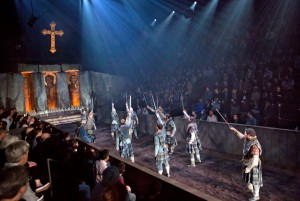 My favorite theatrical experience this week was watching my daughter Olivia play Clotho the spinner, eldest of the Fates, in her class play about Sisyphus. I also enjoyed seeing Sir Kenneth Branagh as Macbeth.
My favorite theatrical experience this week was watching my daughter Olivia play Clotho the spinner, eldest of the Fates, in her class play about Sisyphus. I also enjoyed seeing Sir Kenneth Branagh as Macbeth.
This production of Macbeth represents Branagh’s New York debut and the twenty-fifth production of Shakespeare with which he’s been involved. He played the Scottish king and also co-directed with Rob Ashford.
The production had been performed in a deconsecrated church in Manchester in summer 2013, and has just come to the Park Avenue Armory for a three-week run.
I won’t gush as much as Ben Brantley in today’s Times, but I enjoyed the show. I was pleased to see Branagh try some new things, though in some ways he’s an odd match for this play’s anti-hero: perhaps our most lucid Shakespearean actor taking on a warrior who follows the daggers in his mind. I only really loved Branagh’s performance for a line and a half, but the spectacle was something to see. 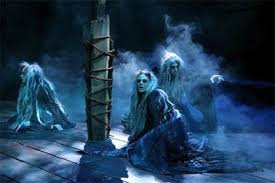
When I got there, the castle just about stole the show. I’d never been to the Park Avenue Armory before. It’s amazing: a massive brick building squatting along Park between 66th and 67th with Tiffany interiors, it once housed the 7th New York militia and has in the past decade been reconfigured as a high-rent arts venue. At its center is the old Drill Room, a cavernous 55,000-square foot space temporarily reconfigured as blasted heath, pseudo-Stonehenge, and muddy stage. Waiting in the dark for the show to begin, I wondered what the space would have looked like empty, or back in its day, filled with soldiers. The audience sat on uncomfortable benches perched steeply on either side of a narrow sand-filled pit of a stage, like spectators at a tennis match. At the open end, which we walked past to take our seats, was a Stonehenge-like array of monoliths, over 20’ high. On the far end was a chancel structure and a collection of burning candles, with a balcony on top, on which Lady Macbeth later washed her hands. Most of the action took place down in the sand. During the opening battle against the rebel forces, which was staged at length though it’s not in the play, rain poured onto the stage. Mud stained the hem of Lady Macbeth’s gown when she arrived a few scenes later.
In a slightly Game-of-Thrones touch, all the audience members were assigned clans. We gathered together before entering the Drill Room and walked to our seats as a group. I was assigned to Macduff, which I had not thought was a clan name, since he’s thane of Fife. We assembled at 6:10, were guided downstairs and together cried our choral response to the bell that summoned us to enter: “Lay on, Macduff!” It’s Macbeth’s line in the play, but it was good fun.
There were some interesting touches in the staging. King Duncan woke before Macbeth killed him, and the murder took place on stage. I’m not sure I liked this move, but I understood it: Branagh as usual opted for maximum clarity, leaving no footnote unstaged. (That’s how I understand the staging of the battle scene to open the play, also. Plus the stage design was good for battles.) The production slimmed the play down to a fast two hours with no intermission, but I didn’t miss much of what they cut, except some of the Porter’s ramblings. The battlefield choreography in the mud and rain was stunning, especially from my overhead view in the upper seats. Like watching football from the upper tier! Maybe the vibe was more World Cup than Game of Thrones.
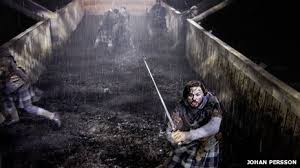 Both Macbeth and his wife voiced their famous lines aggressively. Alex Kingston’s Lady Macbeth drew a circle in the sand and stepped into it before asking the spirits to “Unsex me here.” Kingston was strong and charismatic; her ambition projected all the way up to the unseen roof of the Drill Hall. She delivered this famous speech alone on the stage that had just been vacated by a troupe of armored men, and she filled up the space.
Both Macbeth and his wife voiced their famous lines aggressively. Alex Kingston’s Lady Macbeth drew a circle in the sand and stepped into it before asking the spirits to “Unsex me here.” Kingston was strong and charismatic; her ambition projected all the way up to the unseen roof of the Drill Hall. She delivered this famous speech alone on the stage that had just been vacated by a troupe of armored men, and she filled up the space.
Branagh’s Macbeth, I felt, sacrificed a little fury in favor of his trademark clarity. His diction and evenness of tone made even the mad lines — “Is this a dagger?” “if the assassination / Could trammel up the consequence, and catch / With his surcease success” — sound reasonable. That’s a great quality in an actor, but I’m not sure it’s right for Macbeth, who needs (for me) to feel more dangerous.
He got there by the end, or almost there. I loved the staging of his last visit to the Weird Sisters, in which writhing bodies underneath a large parachute belched forth the line of Banquo, which processed across the sand pit “to the crack of doom.” Branagh’s performance got looser and more physical as it neared its end. The stage fighting remained excellent and was probably the best thing in the show, but there was one other moment I’ll remember, part of the old chestnut about his wife’s death, “Tomorrow and tomorrow and tomorrow.”
He started off flat, and I squirmed in my seat as he trotted evenly through “to the last syllable of recorded time.” But as he neared the too-well-known end, the poetry started to work. It strained his body, bent him over a little, made him too “full of sound and fury” to speak. He stopped a line and a half from the end. I loved the pause, the rupture in the verse’s even movement. “Signifying nothing,” when it came, had a raw asymmetry that departed from Sir Kenneth’s mostly clean performance. A human mess amid the genius. He went back to the gorgeous fighting, and to his dramatic confrontations with young Siward and Macduff, but in that fractured line, Branagh hit his high note. A good place to put it, I suppose.
I stood with the crowd when the cast took their bows – after sitting on a backless bench for over two hours, I was glad to stand up – but I don’t think it was the best Macbeth I’ve seen. The staging was great, and many performances were strong: the Weird Sisters were playful and malicious, Richard Coyle a valiant Macduff (my clan leader!), and Scarlett Strallen stole her scene as Lady Macduff.
Filing out, I thought about that huge space, filled with soldiers in training from 1880 forward, and about military force. I want a bloodier, more dangerous Macbeth, but until then, this one will do.
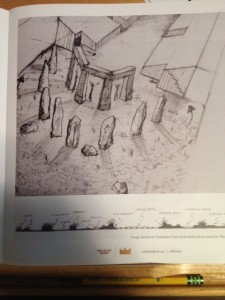
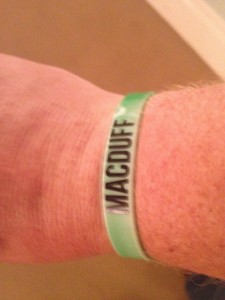
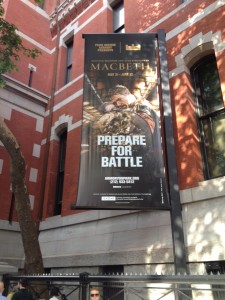
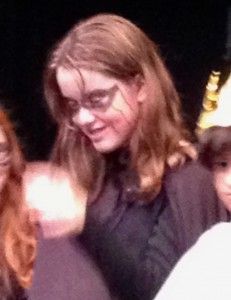
[…] Mentz has a good piece about Kenneth Branagh’s Macbeth at his blog. You can read my take […]